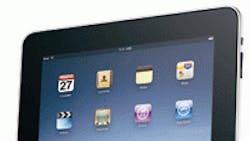Apple's innovation machine, the iPad, is host for games, video, music, web access and a dizzying variety of digital versions of books and magazines. But is the iPad applicable in a work atmosphere? Or, more specifically, does it have a place in manufacturing?
Many signs suggest it does. Manufacturing has increasingly adopted software, in large part to supply information, across all its segments. The easy, intuitive way in which the iPad allows users to move through hard data lends itself to shop-floor use.
"Most of the folks on the plant floor -- your operators, planners and schedulers -- they're not as accustomed to moving in and out of data as people in accounting or human resources are," says Paul Boris, vice president of advanced manufacturing solutions at SAP. "The iPad, though, allows a plant manager to wander through different locations and see real-time information on production and make intelligent decisions."
That decision was made easier when comparing the technology with the electronic invoice systems already available.
"For big burly guys who deliver furniture, [the electronic invoice systems] were kind of tiny," says John Roddy, Arhaus' senior vice president of logistics. "[The deliverymen] are excited about it, and a little hesitant. When they start looking at less paper carried around, the ability to help the customer in the home, it makes it exciting."
According to Ted Schadler, vice president and principal analyst at Forrester Research, the iPad hit the market as a consumer product, but quickly found relevance for business purposes. The technology, he says, is well-suited for anyone who needs information on their feet, whether that be medical staff, a salesperson in a retail outlet or a warehouse manager.
"The iPad's form factor, battery life, mobile Internet access, its panoply of applications and touchscreen abilities make it a great device," says Schadler.
Its only limitations? "More and better business apps," says Schadler. "This is mostly a matter of waiting for the market to build great iPad apps."
That shouldn't take long. Already, SAP has begun offering its new version of Business ByDesign Web software for midsize customers to run on Apple's iPhone and iPad. Competitors such as Oracle, IBM and Microsoft aren't far behind.
At IMTS, machine tool builder Okuma will be demonstrating the iPad's use on the shop floor by showcasing analytics tools that highlight spindle times, spindle utilization and insert tool life across a series of different machines and devices.
"Whatever a person's role is, whether it be a maintenance mechanic, a sales person or an operations manager, it's about empowering people to make decisions in real-time that directly impact business," says SAP's Boris. "If that continues as a real trend, and if the pervasive ability of that data continues, I see some leading-edge companies turning this into a competitive advantage on the manufacturing floor."
See Also:
